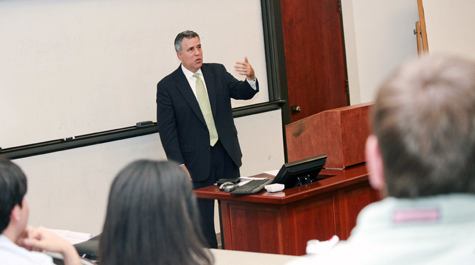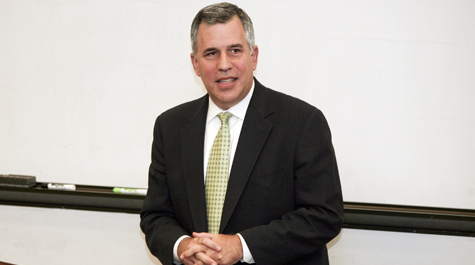Labor Attorney Garland Helps Law Students Take Charge of Their Careers
It doesn’t take much for David Garland ’80 to respond to William & Mary’s call. As an undergraduate, for instance, he served as president of the Student Assembly, and he is currently making a difference on his 35th Reunion Committee.
More recently, he came to William & Mary Law School at the invitation of the Office of Career Services to share advice on how law students can take charge of their careers.
“It’s important to me to give back to William & Mary,” Garland says. “If my comments and advice help even one student, then the trip was worthwhile.”
Garland, a Member of the national law firm Epstein Becker & Green, is a nationally recognized labor and employment attorney based in the firm’s New York and Newark, New Jersey offices. He is Chair of the Firm’s Labor and Employment Steering Committee and a member of the Firm’s Board of Directors.
And although not a graduate of William & Mary Law School, he finds it an impressive place.
“The school is deeply interested in assisting its students in making a successful transition from academics to the profession,” he says. “I’m delighted to be a part of that effort.”
Garland grew up in New Jersey, and was motivated by the same factors that motivate students today when choosing schools. He cites William & Mary’s outstanding academic reputation, small classes providing the opportunity to engage with professors, and a beautiful campus.
Like many William & Mary students, he quickly stepped up to the plate and provided leadership through student government. Not surprisingly, he considers this involvement helpful in his professional life.
“Being involved in student government taught me some of the skills I’ve honed and used today,” he says. “Listen and respect the opinions of others, choose your words carefully because what you say can influence others, and look for creative solutions to problems that others embrace.”
Interested in public service and armed with a William & Mary degree, Garland went to work on Capitol Hill, after which he earned a law degree as an evening student from George Washington University in 1985. He then returned to New Jersey and joined a large law firm as a general litigator.
As an associate, he was assigned to an employment case, enjoyed the issues, and was offered an opportunity to specialize in employment law.
In 2010, Garland joined Epstein Becker & Green. He defends clients in employment discrimination, wrongful discharge, and other employment-related litigation, including cases involving allegations of sexual harassment; discrimination; alleged violations of family leave; whistleblowing, equal pay, and other statutes; and contract, public policy, and tort claims.
Garland considers the people, the issues, and the intellectual challenges as the best part of the job. “It’s never boring,” he says.
He says that his proudest achievement is helping build upon the established reputation of his firm and creating a lasting institution recognized as a leader in its field.
His own leadership is recognized as well. In 2013, Garland was elected to the College of Labor and Employment Lawyers as a Fellow, the highest recognition by one’s colleagues of sustained outstanding performance in the profession, exemplifying integrity, dedication, and excellence. In 2014, he became the only attorney in New Jersey recommended and endorsed by Employment Law Experts.
He was also recommended in the Labor and Employment Litigation category by The Legal 500 United States in 2013 and 2014. Other awards and recognition fill a long resume.
When he returned to William & Mary recently, Garland gave a talk entitled “What the Partner Won’t Tell You, But You Should Know.” This, and a series of afternoon breakout sessions with students that focused on careers in employment law, drew on more than 30 years of valuable lessons he’s learned about building a career in law.
“Take charge of your career from day one,” he says. “Don’t wait for others to come to you. If you’re interested in an area or an issue, seek it out and get involved.”
Garland adds that it is important for law students and new lawyers to identify and take advantage of internal and external professional development opportunities to move their careers forward. And students were receptive to the message.
“I appreciated Mr. Garland's candor about what it takes to succeed in a law firm and his willingness to share his mistakes so that we might learn from them,” says Devin R. Bates, J.D. ’16. “His stories were on point and memorable.”
Bates feels that Garland’s advice about listening to others is particularly important.
“It is great to have opportunities to gain this perspective so that when we get out into a firm we can be much more purposeful about building connections with others,” Bates says.
Garland is glad his advice resonates with students, particularly during a time when every little edge helps.
“The law firm marketplace is probably more competitive than ever,” he says. “If you don’t exploit the available opportunities, then success will become more difficult to achieve.”
About William & Mary Law School
Thomas Jefferson founded William & Mary Law School in 1779 to train leaders for the new nation. Now in its third century, America's oldest law school continues its historic mission of educating citizen lawyers who are prepared both to lead and to serve.

